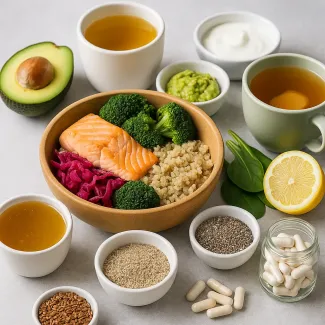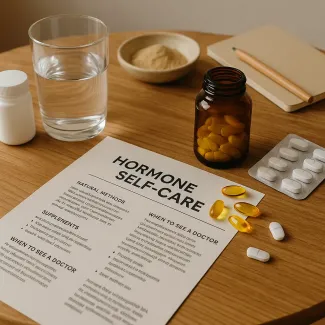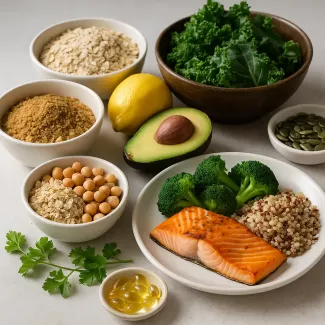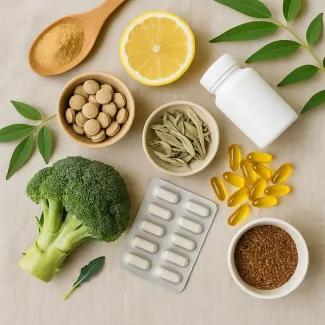
Transform Your Gut Health in Just One Week
A practical, natural plan to reset your digestive system and regain energy
Digestive issues are increasingly common, affecting people of all ages and lifestyles. From bloating and irregular bowel movements to chronic fatigue and brain fog, many of these symptoms originate in the gut. A 7-day gut reset diet provides a structured yet gentle approach to cleanse your digestive system, restore balance to your microbiome, and jumpstart your journey to better health. This isn't a fad or extreme detox; it’s a natural cleanse diet designed to nourish and support your gut through whole foods, hydration, and mindful living.
Why gut health matters more than ever
The gut is often referred to as the body's second brain. It’s home to trillions of microbes that influence everything from immune function and nutrient absorption to mood regulation and metabolism. A poorly functioning gut can lead to symptoms that feel unrelated at first, such as skin breakouts, joint pain, food sensitivities, or low energy. By focusing on your digestive health, you address the root cause of many systemic imbalances.
What is a 7-day gut reset?
A 7-day gut reset is a structured plan to eliminate inflammatory triggers, feed beneficial gut bacteria, and help your body naturally remove waste and toxins. It’s not about starvation or extreme dieting. Rather, it’s about nourishing your digestive tract with gut-friendly foods, while reducing the burden of substances that disrupt your microbiome. Think of it as a digestive system reboot—restoring your body’s internal balance with the power of natural foods and daily rituals.
Signs your gut needs a reset
Your body often sends out signals when your gut is out of sync. Recognizing these signs is the first step toward change. Some of the most common indicators include:
- Bloating after meals or even when you haven't eaten.
- Gas and indigestion that occur frequently.
- Irregular bowel movements, either constipation or diarrhea.
- Fatigue that doesn’t improve with sleep.
- Brain fog and difficulty concentrating.
- Skin issues like acne, rosacea, or dry patches.
- Cravings for sugar or processed foods.
- Mood swings, anxiety, or mild depression.
Core principles of the gut reset diet
A successful gut reset hinges on a few key principles. By integrating these into your daily routine for just one week, you can make a noticeable shift in your overall well-being.
Remove inflammatory triggers
The first step is to remove foods and substances that can inflame the gut lining or disrupt the microbial balance. These include:
- Processed sugar and artificial sweeteners.
- Alcohol and caffeine in excess.
- Dairy (especially if you’re sensitive to lactose).
- Gluten, for those with sensitivity or suspected intolerance.
- Highly processed foods containing additives, preservatives, or seed oils.
Add nourishing, anti-inflammatory foods
Once harmful substances are out, the focus shifts to feeding your gut with healing ingredients. These include:
- Fermented foods like sauerkraut, kimchi, kefir, and yogurt (non-sweetened).
- Prebiotic-rich vegetables such as leeks, asparagus, garlic, and onions.
- Bone broth, rich in gelatin and collagen to soothe the gut lining.
- Leafy greens and cruciferous vegetables that support detoxification.
- Omega-3 fats from wild-caught salmon, flaxseeds, and walnuts.
Focus on hydration
Staying hydrated is essential during any cleanse. Water supports the elimination of waste, helps lubricate the intestines, and keeps digestion moving. Add a pinch of sea salt and a squeeze of lemon juice to your water for added electrolytes and digestive support.
Support with herbal teas
Certain herbal infusions are particularly soothing to the digestive tract. Drink them between meals to reduce bloating and support the gut:
- Ginger tea: reduces inflammation and stimulates digestion.
- Peppermint tea: calms spasms and gas.
- Chamomile tea: supports relaxation and reduces gut tension.
- Fennel seed tea: reduces bloating and gas naturally.
Practice mindful eating
How you eat is just as important as what you eat. Rushed meals, distraction, and emotional eating can disrupt digestion even if you're eating the right foods. Try to:
- Chew thoroughly to break down food.
- Avoid multitasking while eating.
- Eat in a calm environment to support parasympathetic (rest-and-digest) activation.
- Pause and breathe before meals to stimulate digestive enzymes.
Daily structure of the 7-day reset
Each day of the cleanse follows a consistent rhythm that balances nourishment, detox support, and rest. Below is a sample framework to help guide your week:
Morning: Rehydrate and stimulate
- Start with a glass of warm lemon water.
- Follow with a gut-friendly smoothie: use almond milk, banana, chia seeds, spinach, and a tablespoon of flaxseed.
- Optional: probiotic supplement or a serving of kefir.
Mid-morning: Nourishment & movement
- Snack on a handful of soaked walnuts or pumpkin seeds.
- Take a brisk 20-minute walk or do light stretching to stimulate digestion.
Lunch: Anti-inflammatory power bowl
- Combine quinoa, steamed greens, grilled salmon, and fermented vegetables.
- Dress with olive oil and lemon juice.
Afternoon: Herbal support
- Sip peppermint tea.
- Snack on carrot sticks with hummus or an avocado dip.
Dinner: Soothing and light
- Bowl of bone broth-based vegetable soup with lentils or beans.
- Side of roasted root vegetables and lightly steamed broccoli.
Evening: Wind down
- Chamomile or fennel tea.
- Epsom salt bath or a short meditation before bed.
Natural supplements to consider
Although food should be the foundation, certain natural supplements may support your gut reset:
- Digestive enzymes to assist with meals.
- L-glutamine to support gut lining repair.
- Probiotics, especially multi-strain, refrigerated options.
- Magnesium citrate or glycinate for regular bowel movements and muscle relaxation.
Always consult a professional if you're taking medication or have a health condition.
Key benefits after a successful reset
Most people report noticeable improvements within 3–7 days. These can include:
- Flatter stomach and reduced bloating.
- More regular digestion and fewer cramps.
- Increased energy levels throughout the day.
- Improved mood and clearer thinking.
- Better sleep and deeper rest.
- Reduced cravings, especially for sugar and processed food.
- Healthier-looking skin due to reduced systemic inflammation.
Maintaining results after the reset
After the 7-day program, you’ll want to transition gradually and avoid going back to inflammatory habits. Here are some tips to sustain your results:
- Reintroduce potential triggers one at a time, like dairy or gluten, and observe how you feel.
- Keep at least one fermented food daily in your routine.
- Drink water first thing every morning to continue supporting detoxification.
- Continue avoiding processed sugars, especially in packaged snacks and drinks.
- Prioritize fiber intake to keep your digestion regular.
Supporting the gut-brain axis
The gut and brain are constantly in communication via the vagus nerve and neurotransmitters. A disrupted gut can lead to mood issues, poor sleep, and even anxiety. By supporting your gut, you’re also promoting mental clarity, emotional stability, and even immune function.
Exercise and movement for digestive flow
While intense workouts are not recommended during a reset, gentle movement aids digestion:
- Yoga poses like twists and child’s pose stimulate the digestive organs.
- Walking after meals can prevent sluggish digestion.
- Breathwork practices reduce nervous system stress and allow for deeper digestive rest.
Foods to continue beyond the reset
Some gut-friendly foods are so beneficial that they should be part of your long-term lifestyle. These include:
- Leafy greens (spinach, kale, arugula)
- Fermented vegetables
- Sweet potatoes, carrots, and beets
- Wild-caught fish for anti-inflammatory omega-3s
- Chia and flaxseeds for fiber and gut lubrication
- Herbs like oregano, turmeric, and ginger
These foods naturally reduce inflammation, stabilize blood sugar, and create a healthy environment for gut flora to thrive.
Embracing a lifestyle of gut support
A 7-day gut reset is a powerful foundation, but it’s only the beginning of a long-term shift. By understanding how your body reacts to food, stress, hydration, and movement, you build a deeper relationship with your health. The digestive system is incredibly responsive to change, and when you give it what it needs—even for just one week—you set the stage for lasting wellness.
Addressing cravings and emotional eating
One common challenge during any reset is dealing with emotional eating or cravings. These are often signs of imbalanced gut bacteria or unmet emotional needs. Strategies to address this include:
- Drinking water or herbal tea before snacking.
- Eating high-fiber foods to promote satiety.
- Taking a moment to journal or breathe before eating impulsively.
- Adding chromium-rich foods like broccoli and oats to regulate blood sugar.
By aligning your nutrition with mindfulness, you reduce the power that cravings hold over you.
Digestive self-care rituals
Beyond food, your daily habits influence your gut health:
- Get 7–9 hours of sleep every night.
- Practice stress management through breathing, yoga, or nature walks.
- Eat meals at regular times to maintain rhythm.
- Keep a food and symptom journal to observe patterns.
Consistency over time shapes your microbiome, more than any single food or cleanse ever could.
Gut reset and hormonal health
The gut plays a crucial role in hormone metabolism, especially for women. Poor digestion can lead to estrogen dominance, PMS, or thyroid symptoms. A gut reset can:
- Help regulate estrogen clearance through the liver and bowels.
- Reduce excess cortisol, which disrupts digestion and sleep.
- Enhance the production of neurotransmitters like serotonin and GABA for mood balance.
This connection reinforces the importance of using a gut reset not just for digestion but for overall hormonal balance.



